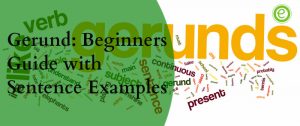You might have been studying English for a very long time. Some people might have joined classes and some would be learning all the concepts through online platforms. The essential thing is to understand them and keep on practicing which would be a great way to imbibe any new concept that comes your way.
So Today we would be beginning our session with Gerund!
Gerund: Meaning and Function of -ing Words
By the definition of English Grammar, Gerunds can be considered as one of the elusive shapeshifters of the English language. With this, you can understand that gerund is a word created out of the verbs and it has to function as a noun.
For instance, by looking at the examples you could clearly understand how they are created and how they function as nouns.
Let’s have a look at the example:
- Will you mind borrowing the supplies?
In the above sentence, you could see that the word ‘borrowing’ can be labeled as a verb. Hence it would be working or operating as a gerund and the word ‘borrowing’ would be a noun.
It is one of the ways to spot a gerund which could be noticed that they are ending in the -ing form. If the words are in the present participle they would end with ‘-ing’.
Let’s see one more example which would be helpful in clarifying the entire scenario.
- You were sitting on the bench.
Use of Gerunds as Subject, Direct Objects and Prepositions
Now we can see that Gerunds can be functioning as subjects, direct objects, indirect objects and sometimes objects of the preposition. In an exceptional form, it would be working as a predicate noun.
You need to identify how gerunds work in a sentence.
Gerunds Working as a subject in a sentence:
- Reading is relaxing.
- Writing is an exchange of ideas.
Gerunds working as a direct object in a sentence:
- I love reading.
- Patrick likes photographing
Gerunds working as an indirect object in a sentence:
- I never gave reading enough of a chance. (verb = gave; gave what? reading)
- Last week, I made studying my priority. (verb = made; made what? studying)
Gerunds working as an object of the preposition in a sentence:
- My love for reading was immediate.
- By reading, we can explore new worlds.
Gerunds working as a predicate noun in a sentence:
- Dawn’s favorite activity is reading. (Reading is identifying the noun “activity.”)
- Her occupation is writing. (Writing is identifying the noun “occupation.”)
Examples of Gerunds in a Sentence
Let’s see some examples of gerunds use in a sentence
- Swimming in the ocean has been Sharon’s passion since she was five years old.
- Let’s go dancing at the club tonight.
- I delayed telling Jerry the bad news.
- Holly decided that flying above the clouds was the most incredible experience she’d ever had.
- Bill avoided doing his math assignment because the World Series was on.
- Singing is one of my hobbies.
- Running is good exercise.
- Watching television does not burn many calories.
- I enjoy cooking with my mom.
- Mark likes playing on the team.
- The teacher appreciated my trying the math problem.
- A good career for me might be nursing.
- My favorite pastime is reading books.
- The most fun I had on the trip was swimming in the ocean.
- The teacher appreciated my trying the math problem.
- Leslie got into trouble for talking to Sarah.
- Dancing is great fun.
- She hates going out at night.
- Cooking is my hobby.
- Smoking is bad for your health.
- Do you enjoy swimming?
- Geocaching can be dangerous.
- Doing homework is boring.
- My favourite activity is using my smartphone.
Conclusion:
With this blog, you can have good understanding of Gerunds and how they can be used in sentences. With Englishbix, you wont be facing issues in understanding the concepts.


